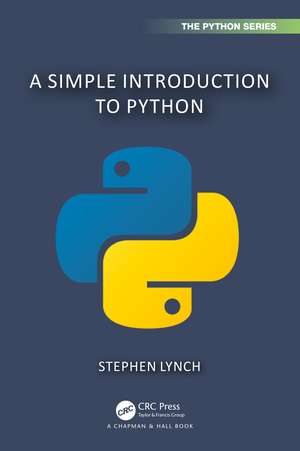A Simple Introduction to Python: Chapman & Hall/CRC The Python Series
Autor Stephen Lynchen Limba Engleză Paperback – 11 iun 2024
The reader is shown how to program using the integrated development environments: Python IDLE, Spyder, Jupyter notebooks, and through cloud computing with Google Colab.
Features:
- No prior experience in programming is required.
- Demonstrates how to format Jupyter notebooks for publication on the Web.
- Full solutions to exercises are available as a Jupyter notebook on the Web.
- All Jupyter notebook solution files can be downloaded through GitHub.
GitHub Repository of Data Files and a Jupyter Solution notebook: https://github.com/proflynch/A-Simple-Introduction-to-Python
Jupyter Solution notebook web page: https://drstephenlynch.github.io/webpages/A-Simple-Introduction-to-Python-Solutions.html
| Toate formatele și edițiile | Preț | Express |
|---|---|---|
| Paperback (1) | 165.54 lei 3-5 săpt. | +14.92 lei 6-10 zile |
| CRC Press – 11 iun 2024 | 165.54 lei 3-5 săpt. | +14.92 lei 6-10 zile |
| Hardback (1) | 576.93 lei 6-8 săpt. | |
| CRC Press – 11 iun 2024 | 576.93 lei 6-8 săpt. |
Preț: 165.54 lei
Preț vechi: 206.92 lei
-20% Nou
Puncte Express: 248
Preț estimativ în valută:
31.69€ • 32.51$ • 26.69£
31.69€ • 32.51$ • 26.69£
Carte disponibilă
Livrare economică 05-19 februarie
Livrare express 21-25 ianuarie pentru 24.91 lei
Preluare comenzi: 021 569.72.76
Specificații
ISBN-13: 9781032750293
ISBN-10: 1032750294
Pagini: 112
Ilustrații: 118
Dimensiuni: 156 x 234 x 7 mm
Greutate: 0.45 kg
Ediția:1
Editura: CRC Press
Colecția Chapman and Hall/CRC
Seria Chapman & Hall/CRC The Python Series
Locul publicării:Boca Raton, United States
ISBN-10: 1032750294
Pagini: 112
Ilustrații: 118
Dimensiuni: 156 x 234 x 7 mm
Greutate: 0.45 kg
Ediția:1
Editura: CRC Press
Colecția Chapman and Hall/CRC
Seria Chapman & Hall/CRC The Python Series
Locul publicării:Boca Raton, United States
Public țintă
AS/A2 and Undergraduate CoreCuprins
1. Python as a Powerful Calculator. 1.1. BODMAS. 1.2. Fractions: Symbolic Computation. 1.3. Powers (Exponentiation) and Roots. 1.4. The Math Library (Module) Chapter. 2. Simple Programming With Python. 2.1. Lists, Tuples, Sets and Dictionaries. 2.2. Defining Functions (Programming). 2.3. For and While Loops. 2.4. Conditional Statements, If, Elif, Else. 3. The Turtle Library. 3.1. The Cantor Set Fractal. 3.2. The Koch Snowflake. 3.3. A Bifurcating Tree. 3.4. The Sierpinski Triangle. 4. NumPy and MatPlotLib. 4.1. Numerical Python (Numpy). 4.2. MatPlotLib. 4.3. Scatter Plots. 4.4. Surface Plots. 5. Google Colab, SymPy and GitHub. 5.1. Google Colab. 5.2. Formatting Notebooks. 5.3. Symbolic Python (Sympy). 5.4. GitHub. 6. Python for Mathematics. 6.1. Basic Algebra. 6.2. Solving Equations. 6.3. Functions (Mathematics). 6.4. Differentiation and Integration (Calculus). 7. Introduction to Cryptography. 7.1. The Caesar Cipher. 7.2. The XOR Cipher. 7.3. The Rivest-Shamir-Adleman (RSA) Cryptosystem. 7.4. Simple RSA Algorithm Example. 8. An Introduction to Artificial Intelligence. 8.1. Artificial Neural Networks. 8.2. The And/Or and XOR Gate Anns. 8.3. The Backpropagation Algorithm. 8.4. Boston Housing Data. 9. An Introduction to Data Science. 9.1. Introduction to Pandas. 9.2. Load, Clean and Preprocess the Data. 9.3. Exploring the Data. 9.4. Violin, Scatter and Hexagonal Bin Plots. 10. An Introduction to Object Oriented Programming. 10.1. Classes and Objects. 10.2. Encapsulation. 10.3. Inheritance. 10.4. Polymorphism.
Notă biografică
In 2022, Stephen Lynch was named a National Teaching Fellow, which celebrates and recognizes individuals who have made an outstanding impact on student outcomes and teaching in higher education. He won the award for his work in programming in STEM subjects, research feeding into teaching, and widening participation (using experiential and object-based learning). Although educated as a pure mathematician, Stephen’s many interests now include applied mathematics, cell biology, electrical engineering, computing, neural networks, nonlinear optics and binary oscillator computing, which he co-invented with a colleague. He has authored 2 international patents for inventions, 8 books, 4 book chapters, over 45 journal articles, and a few conference proceedings. Stephen is a Fellow of the Institute of Mathematics and Its Applications (FIMA) and a Senior Fellow of the Higher Education Academy (SFHEA). He is currently a Reader with MMU and was an Associate Lecturer with the Open University from 2008 to 2012. In 2010, Stephen volunteered as a STEM Ambassador, in 2012, he was awarded MMU Public Engagement Champion status, and in 2014, he became a Speaker for Schools. He runs national workshops on "Python for A-Level Mathematics and Beyond," and international workshops on "Python for Scientific Computing and TensorFlow for Artificial Intelligence." He has run workshops in China, Malaysia, Singapore, Saudi Arabia and the USA.
Descriere
This book is aimed at pre-university students and complete novices to programming. After introducing Python as a powerful calculator, simple programming constructs are covered and the NumPy, MatPlotLib and SymPy modules (libraries) are introduced.














